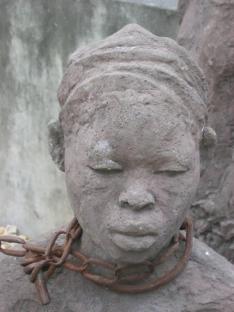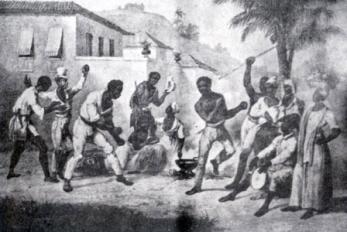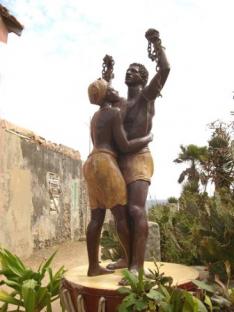The abolition of slavery in Guyana
 August 28, 1833 House of Commons in England approved the bill, introduced by Thomas Bakstonom.Zakonoproekt, which came into force on August 1, 1834, included:
August 28, 1833 House of Commons in England approved the bill, introduced by Thomas Bakstonom.Zakonoproekt, which came into force on August 1, 1834, included:
1. Take immediate steps to abolish slavery in British colonies.
2. All children born during the passage of the law or under the age of 6 years of age are exempted for free.
3. All slaves over 6 years, must work under a contract of apprenticeship 6 years in the case of work on the plantations, and four years in the case of work to other locations.
4. Students should not work more than 45 hours per week without pay, as well as additional hours for a fee.
5. Students should be provided with food and clothing to plantation owners.
6. Means shall be provided for the moral and religious education of former slaves.
7. Compensation in the form of 20 million British pounds to be paid to slave owners for the loss of their slaves.
Act exemption has completed the first phase of a long and bitter struggle against a system that turns people into beasts of burden, without human rights. In slave society, African slaves were regarded as mules, and even a descendant of African slaves known as "mulatto," which literally means "young mule."
With the end of one stage of the formation of colonial society in Guyana has begun a new challenging period. The slaves knew about the impending freedom, and looking forward to it.
 Governor James Carmichael Smith declared the adoption of the law of the Emancipation Proclamation before the law was published in the colonies October 19, 1833. But he did not explain clearly the system of emancipation, not explained to, on what conditions the slaves given freedom.
Governor James Carmichael Smith declared the adoption of the law of the Emancipation Proclamation before the law was published in the colonies October 19, 1833. But he did not explain clearly the system of emancipation, not explained to, on what conditions the slaves given freedom.
I must say that some growers did not want to comply with the law on the abolition of slavery. Several growers in Berbice declared their intention to immediately forward all his slaves in Suriname, where slavery was not abolished until 1863.
It should be noted that the law obliged the release of former slaves to work for their former masters until 1840 to 6 days a week, seven and a half hours a day. But many of the slaves were happy too early release, to understand that the condition of the former owner is mandatory. Or do not fully understand the significance of the item.
Their bosses did not like a law abolishing slavery, and they are not promoted and not interpreted in it.
Release was scheduled for August 1, 1834. This day was a public holiday, and many Africans have become Christians, took part in a religious ceremony. Others danced in their homes, yards and streets. The fun lasted until late at night.
However, early in the morning all the former slaves had expected a shock when they received orders to return to their jobs. This caused great confusion.
Because former slaves could not figure out how they got the freedom to work on their hateful old places.
But this condition was part of a law on the abolition of slavery. The item on "discipleship", when former slaves were obliged to work for the former owners for 6 years, just as they did when they were slaves.
The hosts were obliged to provide moral and religious education of former slaves, but the hostility of the planters for the law to release clearly shows how they really will apply to former slaves during those 6 years. The only thing that changed is the size of the working day. He declined to 7.5 hours.
Perturbations in all the colonies continued throughout the first week of August. The governor personally appear at various locations to educate the workers about their obligations and all items of "contract of apprenticeship" that former slaves had to comply within six years if they were slaves on the plantations, and within 4 years if they were "home slaves. "
 Confusion and unrest continued, and 8 August, five people were sentenced to a punishment of 39 lashes for refusing to go to work and violent behavior.
Confusion and unrest continued, and 8 August, five people were sentenced to a punishment of 39 lashes for refusing to go to work and violent behavior.
In Essequibo August 9, 1834 broke vosstanie.Gruppa of 700 workers refused to go to work on the plantation, saying that they are free men. All the strikers had gathered at the cemetery. Refusal to work lasted until the governor has not yet arrived. He explained to the strikers of their duties on a 6-year contract, and ordered to start work and arrest the instigators of the strike. Despite the fact that these people are not threatened property planters behaved peacefully and did not attack anyone, they were sentenced to prison terms and heavy corporal punishment. The leader of the uprising Damon was sentenced to be hanged and 13 October sentence was executed.
Due to the unstable situation created special magistrates to hear cases of refusal to work and sabotage. Positions in the magistrates took the planters, and not difficult to guess in whose favor the decision was taken. Typically, the judge established severe penalties such as flogging or imprisonment.
The planters were entitled by law to make "students" to work overtime if they work during working hours was not considered satisfactory. Those who refused to work overtime, denied rations of sugar, rum, fish, and salt.
 Another common practice was to enter into plantation workers in jail on trumped-up charges before the arrival of the judge. Let the judge canceled the charge, but the employee still had to work out the time he spent in prison.
Another common practice was to enter into plantation workers in jail on trumped-up charges before the arrival of the judge. Let the judge canceled the charge, but the employee still had to work out the time he spent in prison.
For those who owned the craft and was able to earn money in your spare time, were introduced compulsory fees for licenses to work.
With the abolition of slavery planters received very high compensation from the British government for the loss of former slaves. For every slave they had received an average of 52 British pounds. This was the highest sum ever paid to British colonies.
For the elder or overseer planters received £ 230. On the other hand the slaves who labored for the benefit of the planters and the colonial government did not receive a penny.
During the six years the planters thought about the future, when the free labor "students" would end. They knew that after a period of "learning" African workers will be able to request a higher fee for their work.
To avoid this, the planters decided to encourage the migration of workers from other countries.
The British authorities believed that problems may arise if one group of "students" will continue to work for free for two years after the liberation of the former "house slaves".
Therefore, the total freedom for all "students" was proclaimed on August 1, 1838.
- Log in to post comments





